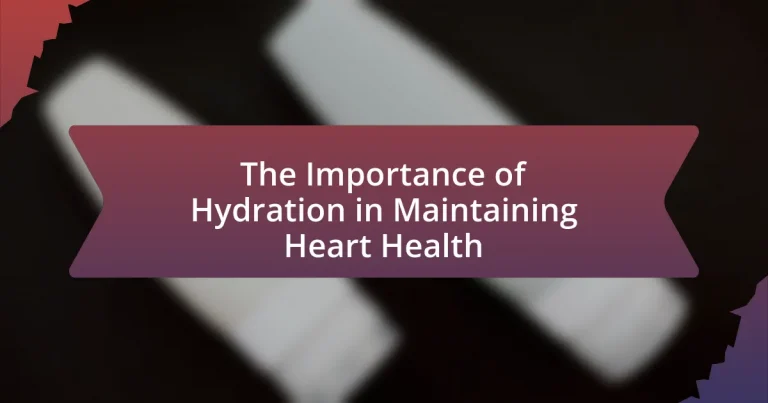Hydration plays a critical role in maintaining heart health by ensuring optimal blood volume and circulation. Adequate fluid intake supports the heart’s efficiency in pumping blood, while dehydration can lead to increased heart rate and blood pressure, straining the cardiovascular system. The article explores how hydration impacts cardiovascular function, the role of water in blood circulation, and the consequences of dehydration on heart health. It also discusses factors influencing hydration levels, including lifestyle choices, dietary habits, and environmental conditions, while providing best practices for maintaining proper hydration to prevent heart disease.

What is the Importance of Hydration in Maintaining Heart Health?
Hydration is crucial for maintaining heart health as it ensures optimal blood volume and circulation. Adequate fluid intake helps the heart pump blood more efficiently, reducing the risk of cardiovascular issues. Studies indicate that dehydration can lead to increased heart rate and blood pressure, which strain the cardiovascular system. For instance, research published in the Journal of the American College of Cardiology found that even mild dehydration can negatively impact heart function and increase the risk of heart disease. Therefore, maintaining proper hydration is essential for supporting heart health and preventing related complications.
How does hydration impact cardiovascular function?
Hydration significantly impacts cardiovascular function by maintaining blood volume and ensuring efficient circulation. Adequate hydration helps regulate blood pressure and supports the heart’s ability to pump blood effectively. Studies indicate that dehydration can lead to increased heart rate and reduced stroke volume, which can strain the cardiovascular system. For instance, research published in the Journal of the American College of Cardiology found that even mild dehydration can impair cardiovascular performance, highlighting the importance of fluid balance for optimal heart health.
What role does water play in blood circulation?
Water is essential for blood circulation as it constitutes a significant portion of blood plasma, which is the liquid component of blood. Blood plasma, made up of about 90% water, facilitates the transport of nutrients, hormones, and waste products throughout the body. Adequate hydration ensures optimal blood viscosity, which affects how easily blood flows through the circulatory system. Studies indicate that dehydration can lead to increased blood viscosity, making it harder for the heart to pump blood effectively, thereby increasing the risk of cardiovascular issues.
How does hydration affect heart rate and blood pressure?
Hydration significantly influences heart rate and blood pressure by ensuring optimal blood volume and viscosity. When the body is well-hydrated, blood volume increases, which can lead to lower heart rates as the heart does not need to work as hard to pump blood. Conversely, dehydration can cause a decrease in blood volume, resulting in an increased heart rate and elevated blood pressure as the body compensates for reduced fluid levels. Research indicates that even mild dehydration can lead to a rise in heart rate and blood pressure, highlighting the critical role of adequate fluid intake in cardiovascular health.
Why is hydration crucial for overall heart health?
Hydration is crucial for overall heart health because it helps maintain optimal blood volume and circulation. Adequate fluid intake ensures that the heart can pump blood efficiently, delivering oxygen and nutrients to tissues while removing waste products. Studies indicate that dehydration can lead to increased heart rate and decreased blood pressure, which can strain the cardiovascular system. For instance, research published in the Journal of the American College of Cardiology found that even mild dehydration can negatively impact heart function and increase the risk of cardiovascular events. Therefore, maintaining proper hydration is essential for supporting heart health and preventing complications.
What are the consequences of dehydration on heart health?
Dehydration negatively impacts heart health by increasing heart rate and reducing blood volume. When the body is dehydrated, the heart must work harder to pump blood, leading to elevated heart rates and potential strain on the cardiovascular system. Studies indicate that even mild dehydration can cause a significant increase in heart rate, which can elevate the risk of cardiovascular events. Additionally, dehydration can lead to thicker blood, increasing the risk of clot formation and potentially resulting in heart attacks or strokes. Maintaining proper hydration is essential for optimal heart function and overall cardiovascular health.
How does proper hydration support heart disease prevention?
Proper hydration supports heart disease prevention by maintaining optimal blood viscosity and circulation. When the body is adequately hydrated, blood remains less viscous, allowing for easier flow through the cardiovascular system. This reduces the strain on the heart and lowers the risk of hypertension, a significant risk factor for heart disease. Studies indicate that dehydration can lead to increased heart rate and blood pressure, which can contribute to cardiovascular complications. For instance, research published in the Journal of the American College of Cardiology found that individuals with higher hydration levels had a lower incidence of heart disease. Thus, maintaining proper hydration is crucial for supporting heart health and preventing disease.

What factors influence hydration levels in relation to heart health?
Hydration levels significantly influence heart health through factors such as fluid intake, environmental conditions, physical activity, and individual health status. Adequate fluid intake is essential for maintaining blood volume and circulation; dehydration can lead to increased heart rate and reduced cardiac output. Environmental conditions, such as heat and humidity, can elevate fluid loss through sweat, necessitating increased hydration to support heart function. Physical activity increases fluid requirements due to sweat loss, and individuals with certain health conditions, like heart disease or kidney issues, may require tailored hydration strategies to maintain optimal heart health. Studies indicate that proper hydration can lower the risk of cardiovascular events, highlighting the critical link between hydration and heart health.
How do lifestyle choices affect hydration?
Lifestyle choices significantly impact hydration levels. For instance, high caffeine and alcohol consumption can lead to increased urine output, resulting in dehydration. Additionally, a diet low in fruits and vegetables, which are high in water content, can further diminish hydration. Regular physical activity increases fluid loss through sweat, necessitating greater water intake to maintain hydration. According to the National Academies of Sciences, Engineering, and Medicine, adequate hydration is essential for cardiovascular health, as dehydration can strain the heart and reduce blood volume, affecting overall heart function.
What dietary factors contribute to hydration status?
Dietary factors that contribute to hydration status include fluid intake, the consumption of water-rich foods, and electrolyte balance. Fluid intake from beverages such as water, herbal teas, and broths directly impacts hydration levels, with water being the most effective. Additionally, foods with high water content, such as fruits (e.g., watermelon, oranges) and vegetables (e.g., cucumbers, lettuce), significantly enhance hydration. Electrolytes, particularly sodium and potassium, play a crucial role in maintaining fluid balance in the body; for instance, sodium helps retain water, while potassium aids in cellular hydration. Studies indicate that adequate hydration is essential for cardiovascular health, as dehydration can lead to increased heart rate and reduced blood volume, negatively affecting heart function.
How does physical activity impact hydration needs?
Physical activity increases hydration needs due to elevated fluid loss through sweat and respiration. During exercise, the body generates heat, leading to sweating as a cooling mechanism, which can result in significant fluid loss; for example, athletes can lose up to 2-3 liters of sweat per hour during intense workouts. This increased fluid loss necessitates higher water intake to maintain optimal hydration levels, which is crucial for cardiovascular function and overall heart health. Studies indicate that even mild dehydration can impair physical performance and cardiovascular efficiency, highlighting the importance of adequate hydration in active individuals.
What environmental factors can affect hydration?
Environmental factors that can affect hydration include temperature, humidity, altitude, and air quality. High temperatures increase perspiration, leading to greater fluid loss, while low humidity can cause increased evaporation of moisture from the skin and respiratory tract. At higher altitudes, the body loses more water through respiration and increased urination. Poor air quality, such as high levels of pollution, can also lead to dehydration as the body requires more fluids to combat the effects of irritants. These factors collectively influence the body’s hydration status and can impact overall health, including heart health.
How does climate influence hydration requirements?
Climate significantly influences hydration requirements due to variations in temperature, humidity, and altitude. In hot and humid conditions, the body loses more fluids through sweat, necessitating increased water intake to maintain hydration levels. For instance, during high temperatures, individuals may require up to 2-3 liters of water daily, compared to the standard recommendation of 2 liters in moderate climates. Additionally, at higher altitudes, the air is drier, leading to increased respiratory fluid loss, which also raises hydration needs. Studies indicate that dehydration can adversely affect cardiovascular function, emphasizing the importance of adjusting fluid intake based on climatic conditions to support heart health.
What role does altitude play in hydration and heart health?
Altitude significantly affects hydration and heart health by increasing fluid loss through respiration and altering cardiovascular function. At higher elevations, the lower atmospheric pressure leads to increased breathing rates, which can result in greater water loss through exhalation. This dehydration can strain the heart, as it must work harder to pump blood effectively, potentially leading to increased heart rate and reduced oxygen delivery to tissues. Studies indicate that individuals at altitudes above 2,500 meters may experience a 30% increase in fluid loss, necessitating higher fluid intake to maintain hydration and support heart health.

What are the best practices for maintaining hydration for heart health?
To maintain hydration for heart health, individuals should aim to drink adequate amounts of water daily, typically around 2 to 3 liters, depending on activity level and climate. Proper hydration supports optimal blood circulation and helps regulate blood pressure, which are crucial for heart function. Research indicates that even mild dehydration can lead to increased heart rate and reduced exercise performance, highlighting the importance of consistent fluid intake. Additionally, consuming water-rich foods, such as fruits and vegetables, can further enhance hydration levels and contribute to overall cardiovascular health.
How much water should one drink for optimal heart health?
For optimal heart health, one should drink approximately 2 to 3 liters of water daily, which equates to about 8 to 12 cups. Adequate hydration supports cardiovascular function by maintaining blood volume and viscosity, which are crucial for efficient circulation. Research published in the Journal of the American Heart Association indicates that proper hydration can help reduce the risk of heart disease and improve overall heart health by promoting better blood flow and reducing strain on the heart.
What guidelines can help determine individual hydration needs?
To determine individual hydration needs, guidelines include assessing body weight, activity level, climate, and overall health status. For instance, a common recommendation is to drink half of one’s body weight in ounces of water daily; this means a 150-pound person should aim for about 75 ounces. Additionally, individuals engaging in intense physical activity or living in hot climates may require more fluids to compensate for increased sweat loss. The National Academies of Sciences, Engineering, and Medicine suggests a daily water intake of about 3.7 liters for men and 2.7 liters for women, which includes all beverages and food sources. Monitoring urine color can also serve as a practical indicator; pale yellow typically signifies adequate hydration, while darker shades may indicate a need for more fluids.
How can one monitor their hydration status effectively?
To monitor hydration status effectively, individuals can track their fluid intake and observe physical signs of hydration. Keeping a daily log of water consumption helps ensure adequate fluid intake, while monitoring urine color can provide immediate feedback; pale yellow indicates proper hydration, while dark yellow suggests dehydration. Research indicates that maintaining optimal hydration levels is crucial for cardiovascular health, as dehydration can lead to increased heart rate and reduced blood volume, negatively impacting heart function.
What are some practical tips for improving hydration?
To improve hydration, individuals should aim to drink at least eight 8-ounce glasses of water daily, as this is a commonly recommended guideline for adequate fluid intake. Additionally, incorporating water-rich foods such as fruits and vegetables, like cucumbers and watermelon, can significantly contribute to overall hydration levels. Research indicates that proper hydration supports cardiovascular health by maintaining blood volume and regulating body temperature, which is essential for heart function. Furthermore, setting reminders to drink water throughout the day can help establish a consistent hydration routine, ensuring that individuals meet their daily fluid needs effectively.
How can incorporating hydrating foods enhance water intake?
Incorporating hydrating foods enhances water intake by providing additional moisture content that contributes to overall hydration levels. Foods such as cucumbers, watermelon, and oranges contain high water percentages, often exceeding 90%, which can significantly supplement daily fluid intake. Research indicates that consuming these foods can improve hydration status, particularly in individuals who may struggle to drink sufficient water, thereby supporting cardiovascular health by maintaining optimal blood volume and circulation.
What strategies can help remind individuals to stay hydrated?
To remind individuals to stay hydrated, effective strategies include setting regular reminders, using hydration tracking apps, and incorporating water intake into daily routines. Regular reminders can be set on smartphones or smartwatches to prompt individuals to drink water at specific intervals, which has been shown to increase overall fluid intake. Hydration tracking apps allow users to log their water consumption and receive notifications, reinforcing the habit of drinking water throughout the day. Additionally, integrating water consumption into daily activities, such as drinking a glass of water before each meal or keeping a water bottle visible, can serve as a constant reminder to stay hydrated. These strategies are supported by research indicating that consistent reminders and tracking can significantly improve hydration levels and overall health.





